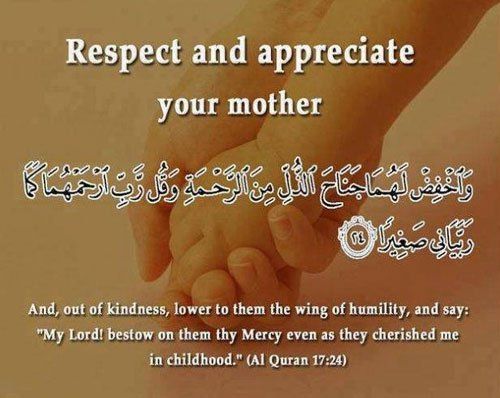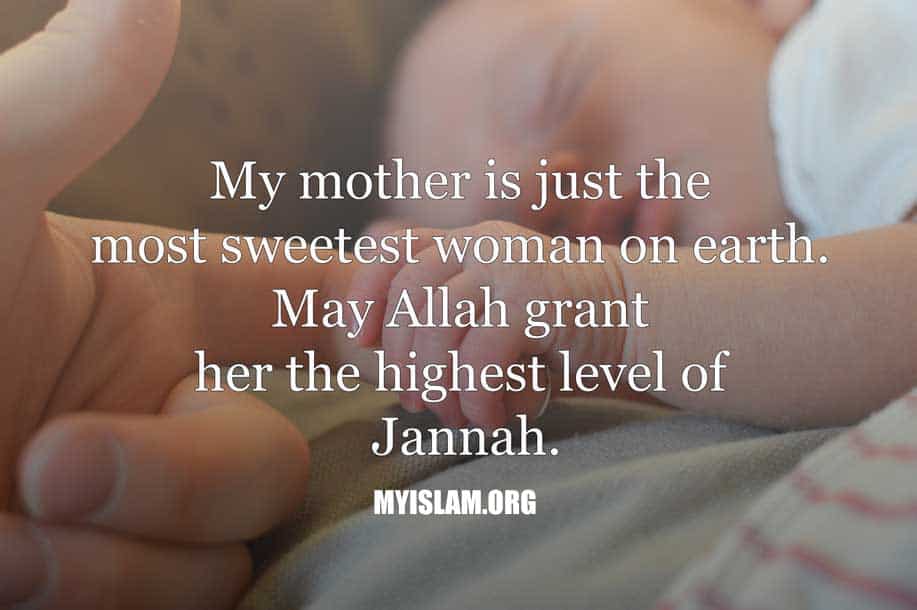Mothers , in Islam, rather, enjoy a very high status and are thus emphasized upon since they are the ones who raise and nurture children. Several teachings and mother quotes reflect respect for mothers within the Islamic tradition and show how important the role they play in the lives of their children is.
Prophet Muhammad (peace be upon him) has mentioned, “Paradise lies at the feet of your mother quotes.” This statement explains the great degree to which Islam values all love, care, and respect given by children toward their mothers. He also said, “Heaven lies under the feet of mothers.” Hence, this is emphasizing the close association between honoring and serving one’s mother with gaining Heaven in the Hereafter.

The Quran also emphasizes the kind treatment of parents, particularly mothers. According to Surah Luqman, Verse 31:14, Allah orders man to be grateful to Him and his parents. The hardships that the mothers undergo during pregnancy, labor pains, and suckling are especially highlighted.
Imam Ali, cousin and son-in-law of Prophet Muhammad, said, “Your Heaven lies under the feet of your mother.” This saying again leads back to the real great spiritual reward and blessing that comes from serving, respecting, and caring for one’s mother.
Check Out : Islamic Quotes For Girls | 2025
Deservedly, it is believed in Islam that the mother, as the most tender, caring, and loving creature, ought to be accorded great respect, honor, and care from the children all the time. Through these teachings and quotes, therefore, Islam attempts to bring out the paramount role played by mothers in the development of people and societies, and goes without saying that mothers ought to be treated with good virtue, compassion, and appreciation.
Mothers Quotes and Gift Ideas for Mother’s Day
Mothers, according to the Islamic tradition, enjoy a very high status. It is often repeated that a child must be really kind towards his or her mother. Here’s a collection of quotes manifesting the sanctified role of mothers in Islam, followed by some gift ideas that can make this day special for your dearest mothers on this Mother’s Day:
15 Islamic Quotes for Mother’s Day

“We have enjoined on man kindness to his parents; in pain did his mother bear him, and in pain did she give him birth” (Qur’an 46:15)
This verse shows the struggles that mothers go through in carrying the child in their womb and bringing it into the world. Thus, mothers should be treated with kindness.
“Heaven lies beneath the feet of mothers.” (Prophet Muhammad, peace be upon him)
The saying brings out that attached to paradise is the pathway of honoring and respecting one’s mother quotes.
A man came to Prophet Muhammad and asked whom he should be best companion to. The Prophet replied, “Your mother.” He further asked, to which the Prophet replied again, “Then your mother.” For the third time, he said, “Then your mother.” It was not until the fourth question when he said, “Then your father.”
This entire Hadith reveals and repeatedly emphasizes the great position of mothers over others.
“And your Lord has commanded that you shall not serve any but Him and goodness to your parents.” (Qur’an 17:23)
This ayah demands believers to worship Allah alone, and along with this, to be good towards parents, showing the esteem of reverence for parents in Islam.
It was said by the Prophet Muhammad: “The major sins are to associate partners with Allah, to disobey one’s parents, to commit murder, and to bear false witness.” (Bukhari)
Thus, disobedience to parents comes in the list of the worst sins, which shows its serious violation of Islamic ethics.
“Out of kindness, lower to them the wing of humility, and say: ‘My Lord, bestow on them Thy mercy even as they cherished me in childhood.'” (Qur’an 17:24)
This verse informs believers to come in a position to show humility and pray for mercy from Allah upon the parents. It can also be likened to a character showing gratitude and good acts.
Jahima came to the Prophet Muhammad to ask for his counsel to join the expedition. He enquired of him if he had a mother; he replied yes, after which he told him: “Paradise is beneath her feet.
The following Hadith shows the great status of being at one’s mother’s service and the rewards which shall be given to a person who does so.
“Three supplications are answered without a doubt: the supplication of the oppressed, the supplication of the traveler, and the supplication of the parent for their child.” (Ibn Majah, At-Tirmidhi, and Abu Dawud)
What this Hadith is trying to say is that the mother’s prayers for her child are special and definitely granted.
The Prophet Muhammad said, “One who desires a long life and an increase in livelihood should show goodness to his parents and establish bonds of kinship.” (Kanzul ‘Ummal)
Good treatment to parents and keeping bonds of kinship are considered ways to receive blessings in life.
“And We have enjoined upon man to his parents good treatment. His mother carried him with hardship and gave birth to him with hardship, and his gestation and weaning period is thirty months.” (Qur’an 46:15)
It refers here to all the hard work and pressures that were on a mother’s body and nerves; therefore, emphasis is placed on showing her good treatment.
“The major sins are to join partners in worship with Allah, to be undutiful to one’s parents, to kill a soul unjustly, and to bear false witness.” (Sahih Bukhari)
Here, disobedience to parents has been placed at par with major sins, thus testifying to the seriousness of this offence against them in the Islamic code of Conduct.
“And We have enjoined upon man goodness to parents. But if they endeavor to make you associate with Me that of which you have no knowledge, do not obey them.” (Qur’an 29:8)
While goodness to parents is commanded, this verse clearly states that one is not supposed to follow their parents in affairs which are against the teachings of Islam.
“We enjoined upon man to be dutiful to his parents. His mother bore him in weakness upon weakness, and his weaning lasted two years. (We, therefore enjoined upon him): ‘Give thanks to Me and to your parents. To Me is your ultimate return.'” (Qur’an 31:14)
This verse tells us about the sufferings of a mother and instructs that gratitude is to be shown to Allah first and also towards the parents.
Abu Usaid Saidi reported: A man asked the Prophet Muhammad whether his deceased parents still had rights over him. The Prophet replied: Yes; and commanded him to pray for their forgiveness and to fulfill their promises and to show hospitality to their friends. (Abu Dawud and Ibn Majah)
Even in death, parents have rights over their children by way of continuing to pray for their forgiveness and fulfilling their commitments.
Asma’ bint Abu Bakr reported that her mother quotes, a pagan, came to see her after the Treaty of Hudaybiyyah. When she sought the advice of the Prophet, he instructed her to show kindness to her mother. (Bukhari, Muslim)
This Hadith shows that one must treat his or her mother quotes with kindness even if she be an unbeliever.

Ideas for a Mother’s Day Present
Islamic books on Islamic teachings or a collection of the Hadith
Personalized jewelry, like a necklace or bracelet, with her name or some good verse
Prayer Mats—An artistically designed prayer mat would be very considerate.
Custom Quran holders—beautifully carved holders for her Qur’an.
Spa day—treat her to a relaxing day at the spa for her hard work and sacrifices.
Handwritten Letters: To thank with full heart and utmost expression of love.
Conclusion
Mothers are given a very high level of status in Islam; to respect and love them is not just your responsibility but also receiving more blessings and rewards. With Mother’s Day approaching, these quotes and gift ideas show the level of respect and love you hold in your heart for your mom.
Yes, here is a list of some frequently asked questions about the role of mothers in Islam, along with their answers:
Frequently Asked Questions on Mother quotes in Islam
- Why has the role of mothers been given importance in Islam?
Mothers are very respectable in Islam because of the huge sacrifices they make right from pregnancy, giving birth, and the nurture. The Quran and Hadith suggest that being kind and respectful towards mothers is not only a moral duty but a means and way to seek Allah’s pleasure and paradise.
- What does the Quran say about mother quotes?
The Qur’an says a number of verses which point to the difficulties that mother quotes have to undergo and the good treatment due to them. For example:
“We have enjoined on man kindness to his parents; in pain did his mother bear him, and in pain did she give him birth.” (Qur’an 46:15)
“And We have enjoined upon man, to his parents, good treatment. His mother carried him with hardship and gave birth to him with hardship.” (Qur’an 31:14)
- What is the meaning of the Hadith, “Heaven lies beneath the feet of the mothers”?
This Hadith explains clearly the highly esteemed and valuable character of a mother in Islam. By this, it is meant that being nice and good towards your mother is a very sure way of securing more blessings from Allah and a safe entrance into heaven.
- How did the Prophet Muhammad (peace be upon him) make an emphasis on the importance of mothers?
The status of mothers was mentioned by the Prophet Muhammad (peace be upon him) many times in different Hadiths. For instance, in response to a question on who should be given most companionship, he replaied, “Your mother quotes,” thrice before giving answer the father. From that, we come to the conclusion that the status given to the mothers in heaven is ideal.
- What are the specific duties one owes to mother quotes in Islam?
The following are the specific duties one owes to the mothers, according to Islamic teachings:
Kindness and Respect: He should respect and treat them with all possible kindness.
Obedience: Fulfillment of their legal commands and avoiding acts that would harm them.
Thankfulness: Giving thanks for all their sacrifices for them by praying for their well-being.
Kindness: Showing kindness and tenderness, and more so during old age.
- What if the parents are non-Muslim?
It still requires of a Muslim to be kind and respectful to one’s parents even if they do not have the same religion. The Holy Qur’an instructs the believers to continue treating the parents well but if they ask you to commit something against the Islamic teachings then you should not listen to them in that matter:
‘And We have enjoined upon man goodness to parents. But if they endeavour to make you associate with Me that of which you have no knowledge, do not obey them.’ Qur’an 29:8
- Are there Hadiths regarding the treatment of one’s mother quotes after death?
Yes, there are some Hadiths reflecting the continuity of maintaining respect for the deceased parents. For example, the Prophet Muhammad, peace be upon him, ordered a man to pray for his dead parents, fulfil their promises, and respect their friends:
“The Prophet Muhammad was asked by a man from the tribe of Salmah if his deceased parents still had rights over him. He replied: ‘Yes,’ and ordered him to pray for their forgiveness, fulfill their promises, and honor their friends.” (Abu Dawud and Ibn Majah)
- What is the notion of Islam on the consequence of treating mothers good in one’s life?
Good treatment towards mothers is believed to bring about a lot of blessings in the form of a long and blessed life, increased sustenance, and pleasure from Allah. Prophet Muhammad ﷺ stated,
“One who desires a long life and an increase in livelihood should exhibit goodness towards his parents and establish bonds of kinship.” Kanzul ‘Ummal
- Mother Quote some examples of quotes about mothers from Islamic tradition.
Yes, here are a few:
“Paradise lies under the feet of the mother.” Prophet Muhammad, peace be upon him
“We have enjoined on man Goal.'” Qur’an 31:14
“And be humble and merciful to both of them with feelings of tenderness, and say, ‘My Lord, have mercy on them, just as they reared me when I was little.'” Qur’an 17:24

AoA, my name is Abd al-Rahman, and my vision is to spread the knowledge of the Quran to everyone. I am proud and tall while standing as your trusted mentor on the journey of learning and memorizing the Holy Quran. I, along with a committed team of Islamic teachers, am bound to provide an easy online facility for Islamic studies and Hifz programs.
